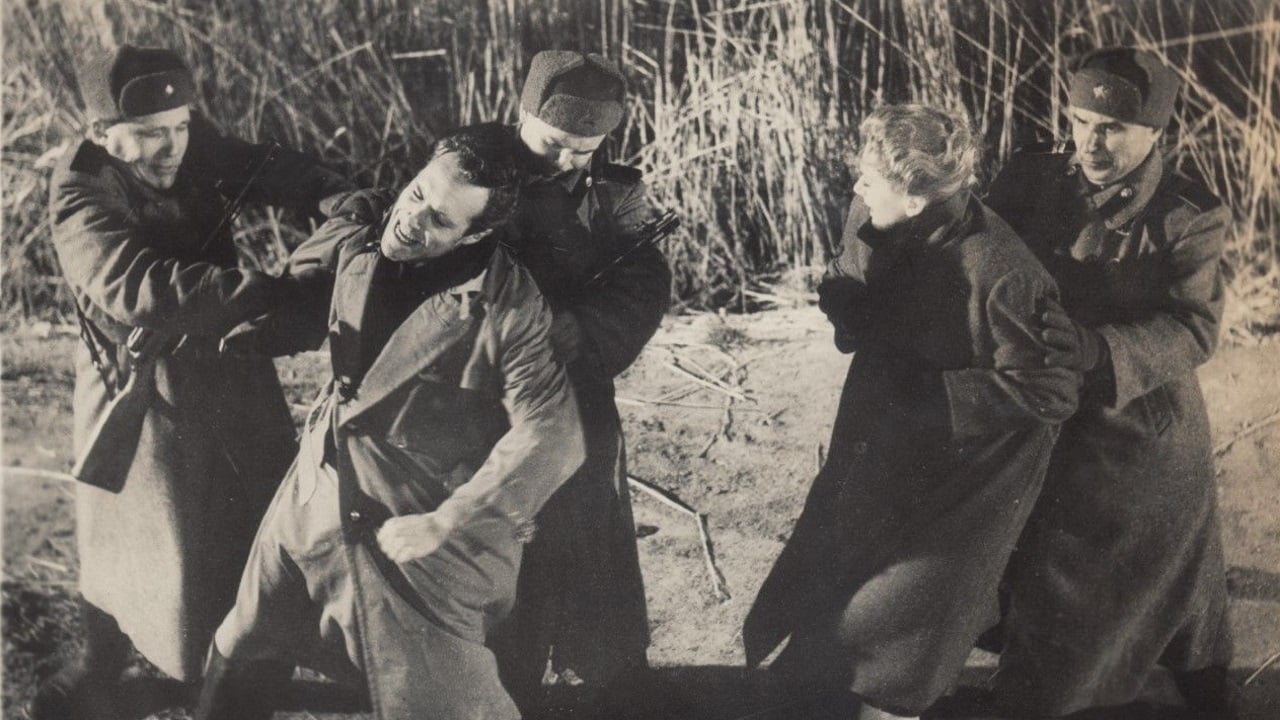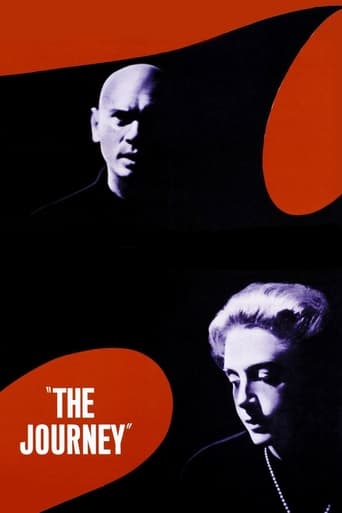

Three years after the memorable "The King and I," Deborah Kerr and Yul Brynner were reunited in this 1959 drama concerning itself with a group of people from around the globe caught up in the 1956 Hungarian uprising. Arriving in the last town of Hungary on their way to Austria, they are taken for interrogation by Russian army people led by Yul Brynner. Among the group is Kerr and Jason Robards. He is a Hungarian fleeing, and Kerr is his lover. Wounded, he can't come down and Brynner at once is suspicious.Robert Morley is wonderful as the spokesman for the group, and we have E.G. Marshall married to Ann Jackson with 2 children.You don't have to wonder why Brynner keeps the group. As in 'King' is as domineering as ever, and Kerr is appealing in her appeal to him for mercy.We have an ending here quite similar to "Casablanca," but the cruelties of war and revolution can't take the time out for love or redemption of Brynner.
... View More"The Journey" is a very good film. Produced in the spring of 1958, in Vienna, and released in 1959, this movie was quite popular in his early years. Despite the political problems, which influenced the movie's success (because the story happens during the Hungarian Revolution, the Cold War), "The Journey" is a very good film, but not well-known. I think it should be released immediately on DVD, because most of the people who have seen it so far want to have it at home. One of the most important qualities of the film is the extraordinary chemistry between Deborah Kerr and Yul Brynner, their intense relationship. All their scenes together are very important, but they also reveal the strong feelings, the great passion and love between the characters (Major Surov and Diana Ashmore). Another quality is the script, which is very well written. It was even published as a novel, by the screen player George Tabori. The film keeps its tension from the beginning to the end. At first, we didn't know if Diana and the other travelers could leave Hungary, because the Communist Major discovers that Diana's friend, Paul Kedes, is Hungarian and he isn't allowed to leave the country. The Major falls deeply in love with Diana and this is, in fact, the true reason why he doesn't want to let her go. But after he embraces her and gives her one of the most memorable kisses ever seen on screen, and she kisses him, too, he lets her go. And the end of the film is one of the most dramatic endings ever filmed-the Major and Diana say "Goodbye!", she arrives at the frontier with all the travelers, including Paul, while Surov is shot several times by some Hungarians, so he dies. Yul Brynner is very, very handsome and Deborah Kerr is very beautiful, charming, refined, just like an English Lady. Yul and Deborah are perfect together. They are one of the greatest couples of the Golden Hollywood. A true moviegoer should watch this film. "The Journey" has everything that a good film should have-a great, captivating story, interesting characters, a wonderful direction (Anatole Litvak is, in my opinion, at his best). Finally, I want to give a message to Warner Bros. Studios or those who restore and release classic films: Please, release "The Journey" on DVD as soon as possible.
... View MoreMost people will consider that Yul Brynner's greatest performance was as the ruler of Siam in THE KING AND I. Certainly it gave him a wide variety of moods to test his abilities in, from comic, to tragic, from eager to learn to dominating to hateful. It also showed him to advantage as a "talk singer" and a dancer. Finally, as it was also his Tony Award winning performance from Broadway, the film allowed us to capture something of the great Broadway performance as well.But he did other movies that showed his talents as well as THE KING AND I. His comic turn in ONCE MORE WITH FEELING was quite nice. So was his performance as General Bunin in ANASTASIA, or his Ramses in THE TEN COMMANDMENTS. Yet he came terribly close to being a 1950s successor to Eric Von Stroheim as "the man you love to hate." A certain vulnerability in his acting and roles endeared him to the movie public, even after his best years as a star were behind him - and he retreated more and more to repeating the King of Siam on television and the stage.To me, his finest performance is in this 1959 drama with Deborah Kerr, Jason Robards Jr., Robert Morley, E. G. Marshall, Anne Jackson, and Ronnie Howard. The film is set in pretty modern times - the powder-keg that was Hungary in 1956, when briefly it looked like the Iron Curtain was about to collapse there under the reforms of Hungarian patriot Imre Nagy and his supporters. But the Hungarian Revolution collapsed due to bad timing. The Russians and their Polish and East German allies sent tanks in to crush the revolt (and arrested and executed Nagy and other reformers). The West stood by and let this happen: England and France had gotten caught in the Suez crisis, and the U.S. had berated them and Israel for attacking Egypt. Due to the actions of three close allies of the U.S., the West found it hard to condemn the overkill of the Soviet Union. It was an unfortunate situation, and the Hungarians have never forgotten how they were abandoned in it.In the film Brynner is Major Surov, a Russian intelligence officer who is watching for some of the leaders of the Hungarian revolt, one of whom is Paul Kedes (Jason Robards). Kedes may be getting assistance from some westerners on a bus tour through Hungary, led by Robert Morley (including Marshall, Jackson, and Howard, and Kerr). The latter are being kept in a hotel while their bus is being repaired, and Brynner mingles with them, hoping for a lead to the whereabouts of Robards. But Brynner is human - he tries to be ingratiating with these people (all of whom see him as a monster), and in sequence, when he has drunk a little too much, he confronts them with the questions that has bothered historians since 1945: How is it (even if one notes that Russia had Stalin in charge) that relations between Russia and the West collapsed so quickly? The allies, on the whole, had worked well together from 1941 to 1945, but after Yalta and Potsdam all types of mutual suspicions just erupted. Did they have to? Surov is a good officer, but he is torn in half by loyalty to the Communist regimes in the Soviet Union and in Hungary that he supports, and his growing fondness towards Kerr, who is hiding Robards but is also willing to note the more human side of the Russian major. And as the film reaches it's tragic climax, we watch as Surov has to decide if he will follow his sense of duty, or take pity on Kerr, Robards, and the other westerners who want to leave. It becomes a true struggle for him - and one that he may win far too late. It was a great film about a tragedy of post war Europe, and possibly the most thoughtful role Yul Brynner ever portrayed.
... View MoreYul Brynner is Major Surov, a singing, dancing, vodka-drinking Russian Officer stationed near the Austrian -Hungarian border during the Hungarian uprising of 1956 in Anatole Litvak's The Journey. Though the film has yet to be released on video or DVD, it remains one of Brynner's most compelling performances. Because of the political unrest, a group of travelers cannot fly out of Budapest but are put on a bus to Vienna. Before they can reach the border, however, their passports are taken and they are detained for questioning by the Russians led by Major Surov.The Major has reason to suspect that there is a Hungarian freedom fighter among the group being smuggled out of the country. Indeed Lady Ashmore is hiding a mysterious passenger, Paul Fleming (Jason Robards, Jr.) who pretends to be an American but fools no one. She is helping Fleming mainly to repay a debt she owed because of the trouble her past association caused him. Among the other passengers are a British journalist played by Robert Morley, an American family played by E.G. Marshall, his wife Anne Jackson and their two children, one of which is the screen debut of little Ron Howard.Major Surov takes a romantic interest in Lady Diana Ashmore (Deborah Kerr), and a romance of sorts develops between them. She offers him nothing but disdain and a stiff upper lip, however, though we suspect that underneath her heart still beats. The Cold War intrigue and the powerful acting carry the story but the romance is never quite convincing. It remains, however, one of my favorite Yul Brynner films and deserves to be seen if only for his passionate performance.
... View More